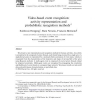Free Online Productivity Tools
i2Speak
i2Symbol
i2OCR
iTex2Img
iWeb2Print
iWeb2Shot
i2Type
iPdf2Split
iPdf2Merge
i2Bopomofo
i2Arabic
i2Style
i2Image
i2PDF
iLatex2Rtf
Sci2ools
CVIU
2004
2004
Video-based event recognition: activity representation and probabilistic recognition methods
We present a new representation and recognition method for human activities. An activity is considered to be composed of action threads, each thread being executed by a single actor. A single-thread action is represented by a stochastic finite automaton of event states, which are recognized from the characteristics of the trajectory and shape of moving blob of the actor using Bayesian methods. A multi-agent event is composed of several action threads related by temporal constraints. Multi-agent events are recognized by propagating the constraints and likelihood of event threads in a temporal logic network. We present results on real-world data and performance characterization on perturbed data.
| Added | 17 Dec 2010 |
| Updated | 17 Dec 2010 |
| Type | Journal |
| Year | 2004 |
| Where | CVIU |
| Authors | Somboon Hongeng, Ramakant Nevatia, François Brémond |
Comments (0)

